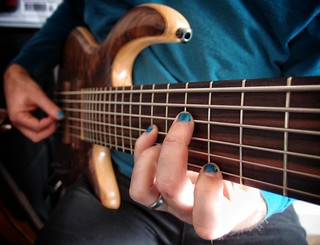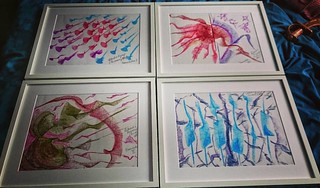 Ad-funding is why we can’t have nice things. I’ve long held this to be true, and have yet to see any useful evidence to the contrary. Pretty much every business idea that relies on it that I’ve come across has to compromise on content, context and impact due to the need for a) massive numbers of page views, and b) the invitation to click away from the thing you’re actually interested in as quickly as possible for the person hosting the thing to get paid for you looking at it.
Ad-funding is why we can’t have nice things. I’ve long held this to be true, and have yet to see any useful evidence to the contrary. Pretty much every business idea that relies on it that I’ve come across has to compromise on content, context and impact due to the need for a) massive numbers of page views, and b) the invitation to click away from the thing you’re actually interested in as quickly as possible for the person hosting the thing to get paid for you looking at it.
As a musician, making music because I think the music itself is the thing that matters, that’s clearly useless. I’m not making sonic clickbait – I’m not trying to gather up likes and views in the hope of hoodwinking some company or other into advertising on my site/giving me money/product endorsements/record deals/whatever. The music is the thing I care about, and the process of making it available and telling the story about it is about supporting its existence.
Barnes Law, section h) “keep your art the main focus. it isn’t about you it’s about your art. do what’s good for your art”
With that in mind, this is VERY interesting stuff from Ev Williams (“Renewing Medium’s Focus” – posted on 4th Jan 2017) – he’s the founder of Medium, and interestingly, the co-founder of Twitter, a platform whose social value has nosedived as it has chased advertising money.
 I was never enticed by Medium, mostly because the idea of giving away my long-form writing to yet another platform that may well collapse and take the whole lot with it struck me as very shortsighted (burned too many times, most recently by Posterous which Twitter bought and shut down, taking about 17 different websites of mine with it – some are back up in skeleton form at Posthaven, but their value and utlity is destroyed)
I was never enticed by Medium, mostly because the idea of giving away my long-form writing to yet another platform that may well collapse and take the whole lot with it struck me as very shortsighted (burned too many times, most recently by Posterous which Twitter bought and shut down, taking about 17 different websites of mine with it – some are back up in skeleton form at Posthaven, but their value and utlity is destroyed)
But I’m glad that Ev is (finally?) questioning the wisdom of ad-funded media online. This for me, is the key paragraph:
“Upon further reflection, it’s clear that the broken system is ad-driven media on the internet. It simply doesn’t serve people. In fact, it’s not designed to. The vast majority of articles, videos, and other “content†we all consume on a daily basis is paid for — directly or indirectly — by corporations who are funding it in order to advance their goals. And it is measured, amplified, and rewarded based on its ability to do that. Period. As a result, we get…well, what we get. And it’s getting worse.”
The whole thing is worth a read, and it’s worth pondering what these reflections say about the relationship between music and ad-funding… While my music is on a couple of ad-funded sites (most notably YouTube) I’ve consciously chosen not to try and monetise it there at all, but instead just to see Youtube as a place that handily hosts video and has a large user base. That’s it. It’s unlikely to ever feature too heavily in how I pay my bills…
The bill paying bit of my music online is currently entirely based around Bandcamp – alongside gigs, teaching, speaking at events, journalism, session work, that’s where I seek to do good work, try to understanding the world through the whatever lens seems the most useful at the time, and somehow not end up homeless in the process. If you want to be a part of that, my subscription service there is the best possible option for both of us – see stevelawson.bandcamp.com/subscribe for more info. I was teaching a ‘marketing the creative arts’ college class yesterday, looking at Bandcamp, and it brought home just how well the advantages for artists are also the advantages for music buyers – there’s almost no ‘win/lose’ aspect to it for anyone…
What do you think? Does advertising have a future as a way of funding news and art online? Friends in ad-funded business seem to be having a really hard time making it work, certainly making anything of value AND making it work… you either own every step in the equation (ie, you’re Google or Facebook, and you own both the platform, the ad business and the massive global data-harvesting project that is actually the product you sell) or you end up making money for one of those two in the hope that you’ll get somewhere further on down the line… Meanwhile ad-funded start-ups are collapsing all over the place, and musicians are desperate to have a ‘viral’ YouTube hit in the hope that they’ll get some return on their video production costs… That doesn’t sound like the kind of world I want to live in. You?
[addendum – it’s worth pointing out that Bandcamp is a 3rd party site that could also at some point go down leaving me with no sales platform or anything, having put all my eggs in that one basket… my reasons for seeing it as significantly different to Posterous/Medium/Facebook etc. is a subject for another post soon, but it did seem like a thing that was worth flagging up at this point…]

Steve,
Have you heard about Steemit? It’s a blockchain-based blogging platform that pays users based on votes. It doesn’t have advertising as a portion of their Bitcoin-like currency that is mined each day is used to reward posts. It has a real value in that you can easily sell it to get Bitcoin and then use that however you like. It’s still being developed and only has a few thousand active users, but I manage to make a few dollars per day just posting my thoughts. Your friend Lloyd Davis is also on there.
I’m hoping that in time it will be possible to buy music and art using their Steem currency. For now you can do transfers to other users with no fees.
There’s no referral scheme, so I don’t get anything if you sign up, but I’ll obviously support you if you do.
Everything is advertising. My blog is ostensibly advertising free but I mention plenty of goods, services and also ideas, any of which readers may follow up.
Balancing that, everything is also an investment. What I say might not carry a huge amount of weight but it is still another pebble in the jar, whether I mention that I’m enjoying your latest release or sounding off that I’m still not eating Kit Kats because I want to protest against Nestlé’s ethics (disinvestment!).
It will be interesting to see how the Internet and other communications technologies evolve over the next few years. The present ‘Information Age’ is a blip in the larger scheme of things and far from essential for human life (however fun, educational and enriching it might be). If the trajectory from the birth of the web until now continued for another 20 years we’d be in a virtual world where ‘real life’ might be something a privileged few dipped into from time to time but that curve is far from certain so laying some foundations that aren’t based on the present status quo is probably wise!
For me, Patreon has been a game-changer. And like Bandcamp, it runs by taking a small percentage of what artists are paid, rather than having any advertising.
I love Bandcamp too but since the artefact of my creative process that others engage with is sheet music, rather than recordings, it doesn’t serve my needs so well.